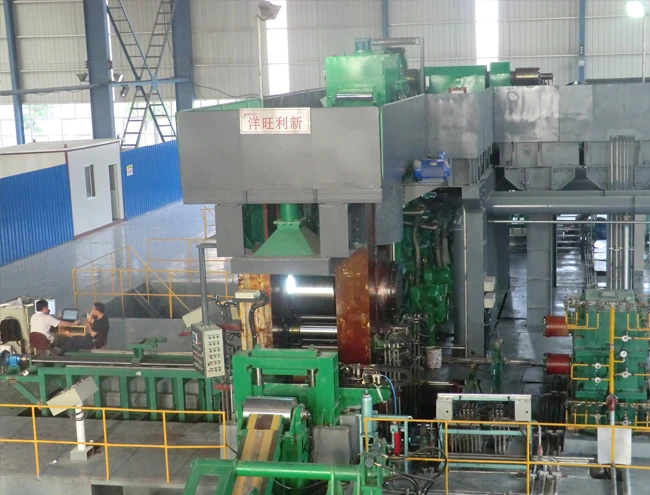
Roll Bonding Cladding: Corrosion-Proof Layers, Fast Delivery
Roll Bonding Cladding is a key solution in the manufacturing industry, specifically within Special Equipment Manufacturing Industry and Manufacturing of metallurgical specialized equipment. This article explores how Beijing Yang Wang Li Xin Sci&Tech Co.,Ltd. supports professionals with durable, high-performance products, and explains why this product is an ideal choice for businesses in these sectors.

Table of Contents
- Roll Bonding Cladding Overview
- Benefits & Use Cases of Roll Bonding Cladding in Manufacturing of metallurgical specialized equipment
- Cost, Maintenance & User Experience
- Sustainability & Market Trends in manufacturing
- Conclusion on Roll Bonding Cladding from Beijing Yang Wang Li Xin Sci&Tech Co.,Ltd.
Roll Bonding Cladding Overview
Roll bonding cladding is a solid-state joining process that permanently bonds dissimilar metals—such as stainless steel, titanium, nickel alloys, or copper—to a backing plate of carbon or low-alloy steel through high pressure and, in many applications, elevated temperature. In hot roll bonding cladding, meticulously cleaned and prepared metal layers pass through a cladding rolling mill where compressive forces create a metallurgical bond without filler material. The result is a bi-metal or tri-metal plate offering the corrosion or heat resistance of the clad layer with the strength and cost-efficiency of the base layer.
- Relevance: In the Special Equipment Manufacturing Industry—especially within Manufacturing of metallurgical specialized equipment—roll-bonded clad plates underpin pressure vessels, heat exchangers, digesters, pickling tanks, and clad pipes for harsh chemical and high-temperature environments.
- Technical scope: Typical lines integrate surface preparation, stack assembly, vacuum degassing (when applicable), hot/cold rolling passes, heat treatment, levelers, edge trimming, ultrasonic testing, shear/plate cutting, and flattening to deliver high bond integrity and tight thickness tolerances.
- Manufacturing partner: Beijing Yang Wang Li Xin Sci&Tech Co.,Ltd. engineers cladding rolling mill solutions tailored to multi-metal combinations, production throughput, and quality control requirements—backed by commissioning, training, and long-term service.
Benefits & Use Cases of Roll Bonding Cladding in Manufacturing of metallurgical specialized equipment
Across metallurgical equipment manufacturing, roll-bonded clad plate enables equipment builders to meet aggressive corrosion, wear, and thermal cycling demands while controlling material costs. Common applications include sour-service pressure vessels and reactors in refining and petrochemicals; desalination and chemical processing heat exchangers; autoclaves and digesters in non-ferrous metallurgy; and storage tanks or pickling lines in steelmaking. For pipeline producers, roll-bonded plate is a reliable feedstock for clad pipe, integrating seamlessly with downstream clad pipe welding processes.
- Performance advantages: High bond quality verified by ultrasonic and shear testing, excellent thickness uniformity, and the ability to combine premium alloys with economical substrates for superior lifecycle value.
- Process flexibility: Supports hot roll bonding cladding and cold finishing passes to achieve specific mechanical properties, flatness, and surface finish, ready for forming and welding.
- Competitive edge: Beijing Yang Wang Li Xin Sci&Tech Co.,Ltd. delivers automation, inline NDT, and robust mill mechanics that help producers reduce rework, improve yields, and accelerate lead times for complex multi-metal orders.
Cost, Maintenance & User Experience
For B2B decision makers, total cost of ownership is driven by yield, uptime, energy efficiency, and product quality. Roll bonding cladding minimizes the use of expensive alloys by applying just the corrosion-resistant layer needed, reducing material spend compared with solid alloy plate or some overlay methods. Inline process control and NDT reduce defects and scrap, supporting faster delivery and stronger cash flow. Customers in the Special Equipment Manufacturing Industry highlight predictable plate flatness and bond integrity that simplifies downstream forming, welding, and machining—especially important when the plate will later undergo clad pipe welding or precision fabrication for pressure equipment.
- Durability and service: Beijing Yang Wang Li Xin Sci&Tech Co.,Ltd. designs mills with wear-resistant components, accurate roll gap control, and accessible maintenance points. Remote diagnostics, operator training, and spare parts availability help sustain high uptime and protect ROI.
- Operational feedback: Users report smoother qualification audits due to reliable bond testing records and data traceability, with maintenance intervals aligned to planned shutdowns to minimize production disruption.
Sustainability & Market Trends in manufacturing
Sustainability and regulatory pressures are reshaping metallurgical equipment supply chains. Clad solutions enable significant alloy-material savings versus solid CRA components, cutting embodied carbon and cost. When combined with efficient hot roll bonding cladding routes and precise temperature control, producers can further lower energy intensity. Market demand is growing in hydrogen, LNG, CCUS, desalination, and critical minerals processing—sectors that require corrosion resistance and robust quality documentation.
- Compliance and digitalization: Enhanced traceability, from plate chemistry to ultrasonic bond maps, supports conformity with international codes and customer audits.
- Eco-conscious engineering: Beijing Yang Wang Li Xin Sci&Tech Co.,Ltd. prioritizes energy-efficient drives, regenerative braking on mill stands, optimized lubrication/filtration, and process integration that reduces rework—helping customers meet sustainability KPIs while improving throughput.
Conclusion on Roll Bonding Cladding from Beijing Yang Wang Li Xin Sci&Tech Co.,Ltd.
Roll Bonding Cladding equips manufacturers in the Special Equipment Manufacturing Industry with high-performance, cost-efficient materials for demanding environments. By combining the right alloys with solid process control, producers achieve durable bonds, reliable flatness, and streamlined fabrication—whether for pressure equipment, heat exchangers, or clad pipe lines. Beijing Yang Wang Li Xin Sci&Tech Co.,Ltd. stands out with engineered cladding rolling mills, strong application support, and lifecycle service.
- Recap: Superior bond quality, alloy savings, and production efficiency for metallurgical specialized equipment.
- Trust: Proven engineering and service from Beijing Yang Wang Li Xin Sci&Tech Co.,Ltd.
- Strong CTA: - Contact us: email: Alley.wang@bjywlx.com - Visit our website: https://www.bjywlx.com
-
YWLX’s 1450mm Six-Hi Reversing Mill Goes Live in BangladeshNewsNov.24,2025
-
Adjusting Roll Gap in 6Hi Reversing Cold Rolling Mill for Thin StripNewsNov.13,2025
-
Quality Control Standards for Automatic Gauge Control in Strip RollingNewsNov.13,2025
-
Effect of Skin Pass Rolling on Metal DuctilityNewsNov.13,2025
-
Key Components of a Modern TempermillNewsNov.13,2025
-
Common Wear Patterns of Work Roll in Tandem Cold Mill OperationsNewsNov.13,2025
-
Revolutionary Skin Pass Rolling Technology for Enhanced Steel QualityNewsNov.04,2025










